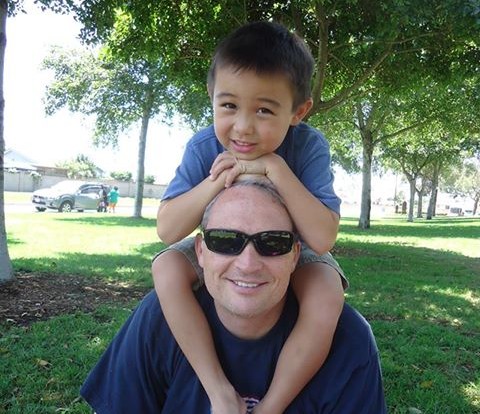
“DNA is only as meaningful as lost and rudderless people make it.” ~kw
My then-6-year-old son Jacob and I were talking about names back a while ago.
He told me there was a boy in his class named Isaac like in the Bible. My son’s name is Jacob (the Biblical son of Isaac), so I asked if there was a boy named Abraham (the Biblical grandpa of Jacob) in his class as well.
I kinda thought it would be cool if there was.
This is how the rest of that conversation went:
Jacob: “No, but there’s a boy named Danthy.” (Yeah, not sure what that had to do with my question either)
Me: “Oh, is he from another country?”
Jacob (puzzled): “No … he’s from my class!”
Hmmm. From the mouth of babes.
I wonder how long it will be and what will have to happen to get us to stop segregating and dividing and subdividing people into groups and races and categories of this and that and us and them.
Why do we have to identify and classify people this way?
The Classificationization of Humanity
Why do we take the whole of humanity and carve them up into distinct categories of semi-related groups and subgroups, sorted and classified as separate clusters of generalized characteristics, all tagged and marked for racial and lingual and socioeconomic distinction, subsectioned into demarcated and clearly separated differences?
Why not think of others the way my son does?
Just people.
Certainly classifications are useful in some instances. Identifying a suspected mugger comes to mind as an obvious example. To tell the police you were just mugged by a fellow human being is not very helpful, after all. We have over 38 million of them in my state alone.
But other than a handful of common sense exceptions, who cares what color you are! Who cares what one’s national origin, native tongue or favorite holiday is!
Certainly not as a measure of value or worth of the individual!
I think we have it wrong on another level as well. As a well-intentioned response to the segregation of the past, we’ve adopted the rhetoric of celebrating our differences. But I don’t think it will ever work in the long run because it focuses on our differences. It amplifies what’s not held in common and puts those differences center-stage.
I think the only way to root out the cultural subdivisions that plague us is not to celebrate difference, but to not care that there is any.
A Better Way
My son is half Chinese. I’m a white guy. But I would be pained to think that my son identified with his Chineseness any more than if he identified with his whiteness or Caucasianness.
I want him to find identity in his decency, with his values and character. I want him to find self-identity in our faith and our family culture informed by that faith.
I would cry if he found self-identity in the arbitrary accident of race.
Stupidity is Thicker than Blood
Race is meaningless. If my son’s identity was wrapped up in his race, his identity would also be meaningless.
As a matter of fact, I would rather my son lack a sense of identity altogether than have it centered in the poison of blood. Blood-centric thinking produces things like pogroms, Jim Crow laws, Apartheid, ethnic cleansing, slavery, neo-Nazis, concentration camps and Final Solutions.
Telling me you’re black or white or brown or yellow or any other color under the sun tells me nothing of importance about you.
I don’t know if you’re kind or compassionate, loving or responsible, honest, courageous, humble, funny, outgoing, determined or happy. I don’t know if you’re a good spouse or parent or neighbor. I know absolutely nothing of significance about you.
Us vs. Them
That’s what my son saw in his friend Danthy. Just a kid. Not someone alien or divided from him. Just a kid named Danthy. From his class. A friend. That’s all.
What would life be like if we all thought this way? What would happen to conflict and war and to our personal happiness if such was the universal attitude?
So much of the hatred, distrust, vengeance, anger, abuse and violence inflicted by one group on another would fade into history.
If we truly believed that every other person was a brother or sister, no longer “us” vs. “them”, much of the animus between peoples would disappear.
Then we could start identifying with humanity instead of some color-coded subset of the whole.
Eighty-Eight Percent
Did you know that only 12% of your DNA is different from every other race? That means 88% of your genetics are the same as every other racial category. Brothers and sisters are only a smidgen more than 10% more similar than two strangers from different nationalities, colors and cultures.
Biochemically we are 99.9% the same as any other human being regardless of race or national origin.
The point is, of course, that every single one of us is profoundly more similar to any and every other person on the planet than dissimilar.
(Read I and Thou)
If we can finally drop racial categorization as worse than a meaningless practice, but as a harmful, distancing and separating impulse, the Jacobs of the world will have taught us something deeply profound, but something that should never have been considered so.
Really, it should be as common and obvious as night following day.
Afterthoughts
My call to a new consciousness is not a naïve one. Sadly, there will always be those who kick dogs, but will control that impulse only when they cross a dog with sharp teeth willing to bite. Decent nations therefore need to keep their teeth sharp.
But I still look to a time when human unhappiness will be the largest international crisis.
In the meantime, I write in hopes of changing one heart at a time to open theirs and let those who look and speak differently in.
Your happiness depends on it.
So does the world’s.
What do you think?
Agree? Disagree? Please share your thoughts in the comments below.







































It is very interesting how kids don’t care much for the “difference.” They’re only judgmental when their parents train them to be. You’re right, I also wish that we could still see through the lens of a child. We don’t need to be dividing up one another. It’s just not right.
Vincent recently posted … What No One Talks About, The Downsides of Success
Kindred spirits, Vincent! Sometimes kids teach and remind us of what truly matters … and what truly doesn’t. There’s the lingering movement to make sure everything is equally distributed and fairly allocated, so racial groups are measured and monitored to ensure every category and subcategory of humanity have their fair share. But in that effort to ensure equality and fairness, I wonder if the proponents of equality aren’t inadvertently keeping the differences too front-and-center.
Ken, I’ve had some solid a-ha moments as my Vidur was growing up. Still do, in fact. I’ll never forget the first time he said, when he was 7 years old, “I see a world without boundaries. Why can’t there just be east, west, north and south to help us see directions? Everyone has the same Sunday-Monday…then why different castes and countries?” I doubt if he knew exactly what he was talking about…maybe he was – children have such black and white clarity of thought usually…but it touched my heart. Somehow, instinctively he has grown up knowing that one must not differentiate between two humans, and be compassionate. One essay he wrote comes to mind, where he said there are two types of people, those who are fortunate and those who are less fortunate. If we are better off, we should share with those who don’t have.
Seriously, out of the mouths of babes. I marvel at how children in a class get along absolutely well regardless of status, while the parents turn their noses up at those who are economically weak. And I love it when the children of these people excel in their academics.
The world would certainly be a happier place if everyone treated everyone equally…unless they are like my upstairs neighbor who drains their dirty water into our balcony late at night, assuming we don’t know. 😀 Then of course, they need a piece of our minds…or what’s left of it after we have raged over their nastiness.
Hehehe. No, I don’t get worked up. Love, Vidya. Have an awesome week!
Vidya Sury recently posted … Inspiring Stories – A Social Entrepreneur
Well, Vidya, I have to say (and I’m sure you won’t object) that I haven’t met too many 7-year-olds who would have put it quite that way! You have yourself quite a bright and impressive young man there. Vidur’s essay reminds me of Viktor Frankl’s assertion that “There are only two races: the decent and the indecent.” That’s been the motto of my life, even if only articulated that particular way the last decade or so.
I work in an economically depressed area (for US standards, anyway), and have seen some of those who had very little lead the school academically so many times that most people don’t think twice about it.
Why people take pride in something they didn’t do, had no control over and required nothing of them is something I’ll never understand. Whether family name, race, caste, or whatever, I just don’t get the pride thing placed in the absence of having earned anything.
Sorry to hear about the balcony problem, which is why I like Frankl’s concept of race. While I won’t judge the totality of someone’s decency over the one issue, it is telling. Hope that get’s resolved for you! I know I have enough of my own dirt to get someone else’s poured into my place! 😉
Love and hugs back and hope your weak was and weekend will be at least as equally awesome!
I think I couldn’t agree more, Ken. Amen and amen. I love how my daughter identifies her friends as only that – her friends. Her occasional comments about one being brown or peach means nothing more significant than the ones about one having blue eyes or green, blonde hair or red, or being shorter or taller than she is. It’s as innocuous as saying one has a purple shirt or a blue one. To her, they are simply points of observation. She loves them all just the same. Kids don’t have natural prejudices – that kind of thing has to be taught. And, sadly, all too often it is.
Lisa recently posted … Ten Things of Thankful – Just Under the Wire
“It’s as innocuous as saying one has a purple shirt or a blue one. To her, they are simply points of observation.” Beautifully said, Lisa. To add significance to color is like grouping people with larger knee caps or bushier eye brows together and suggesting superiority or inferiority for such accidents of nature. It’s all too silly, if not for the horrific tragedy such thinking has produced around the world and through history.
So long as this generation doesn’t plant the seeds of hate and judgment in the next generation, they’ll paint a better picture of an improved tomorrow. In the meantime, we talk and write and share a set of values that lifts and builds and sees each other as people, friends, nothing more than a kid in a class or a neighbor down the street.
Aw I loved this post!
Kids truly show us the true meaning of life and happiness. They are so simple-minded in the sense that they don’t over complicate things like we grown-ups do. I see my little one-year-old daughter burst into laughter while my husband plays peek-a-boo with her. Just pure joy in her eyes, not a care in the world. She doesn’t care that she’s wearing a stained, hand-me-down onesie. She doesn’t care about our small apartment. She doesn’t care that mommy has no make-up, is wearing sweats and hasn’t showered in two days. She doesn’t care what kind of car she is driven around in. My baby is truly happy with just the basics–food, sleep, and lots of love. She couldn’t be happier! Sometimes i can get so caught up in the mindset of basing my happiness once i have this or that or the other. But in the end, it’s just artificial happiness and is not true happiness. We can learn so much from our little ones because they remind us of what is most meaningful in life. Thank you for posting 🙂
Hi beautiful Becki! So glad you enjoyed reading the post. I can’t tell you how many times Jacob tells me when I explain something to him and in the process of breaking it down, inadvertently complicate the whole thing.
I LOVE this so much: “She doesn’t care that she’s wearing a stained, hand-me-down onesie. She doesn’t care about our small apartment. She doesn’t care that mommy has no make-up, is wearing sweats and hasn’t showered in two days. She doesn’t care what kind of car she is driven around in. My baby is truly happy with just the basics–food, sleep, and lots of love.”
Wow! So eloquently stated! And so true! We can get so fixated on what truly doesn’t matter, emotionally elevate it to the point that it FEELS like it does, and act it out as though it did because we’re told so often that whatever is important to us is therefore important … period. But there are inherent levels of value. And our kids help us recognize what is and what isn’t. I know you did that for me.
Nice Ken. And great photo. At the risk of sel promotion once again, here is a recent post of mine about seeing the humanity in others. I got lots of positive feedback about it. I think you will find it of interst.
http://www.sixsimplerules.com/leadership-seeing-the-humanity/
All the best,
David
David J. Singer recently posted … Kiki: Happiness Lessons from a Chronically Unique Kid
You’re awesome, David. Thanks for sharing. And can’t wait to get home where I can watch the video of your niece! Humanity can be both depressing when you think of some of the great evil that has been perpetrated and accepted by far too many and deeply inspiring when you think of the much larger part of the human race that has done so much good in the world, often for no benefit for themselves for doing it. So having said that, humanity is much more often a source of profound inspiration to me.
Thanks Ken. And I’m glad you are going to, or did, watch the video of my young cousin. She’s an incredible kid, and very inspirational.
All the best, David
David J. Singer recently posted … Kiki: Happiness Lessons from a Chronically Unique Kid
Thank you for this article, it’s a refreshing one along with a refreshing thoery. I think it’s a bit sad that so few of us are asking for these things. As an African American female, I find myself lost in disparity over the fact that I am not sure we will ever live in a world that doesn’t gain some sort of entertainment over keeping us at distance. Every time I think I’ve done something to bridge that gap, something happens to wedge us further apart.
You will have to forgive my outlook but I am speaking from my realistic experiences and many times I just want to give up trying.
However, no matter what, I know that my childhood was filled with people from many walks of life and those people taught me that we are no different from one another.
Shirley recently posted … Video Postcard: Women at Her Toilette (1875/80) (by…
My sons James and Dan are autistic and I have learned a lot from them about labels. James himself is biracial (African American and white), but racial identity is not really important to him. He described someone to me once as “brown” (because of his skin color), but he had no concept of all that goes with a label of “African American.” Neither James nor Dan has a concept of “disabled” and neither sees himself as disabled.
I have written about this a lot myself, most recently in my post titled “My Name Is You,” so you are preaching to the choir here, my friend.
Having said that, I’m not proposing ignoring our differences. Our differences are a source of rich opportunities for expanding our experience of different cultures, languages, customs, world views, and more. But if we can drop the judgments and approach our differences with open curiosity and genuine welcome, then the differences will no longer divide us.
Galen Pearl recently posted … Be Careful What You Wish For
My father is an immigrant from Japan, my husband is from Tonga and in my family we have spouses that are Korean, Somoan/Caucasian, Filipino/Caucasian and good old Hienz57 Caucasian. I have 5 kids the oldest is adopted and he is half Tongan and half Samoan.
At a very young age my children would describe their friends by shades of brown. So and so is light brown like my sister, or dark brown like my brother, or white like you mom. It was very innocent just like saying they have brown hair or blue eyes. I love the way see the world and love that we live in a place where everyday they meet people from every race, religion and culture.
As a family that is so diverse, one the best things about us is our differences. Not differences we are judge by, but that give us depth, dimension and expand our understanding of the world. Between us all we have lived in 8 different countries and speak 5 different languages. Because my children’s lives are saturated in all of this diversity, they form their opinions of people by there actions. They love the differences in people just like they love personality traits. She’s funny, he’s Hmong it’s just matter of fact.
Thanks for the great perspective and cutie pie kid by the way. I may be partial to the mixed kid thing though.
HI, i believe that life is always good in the eyes of a child. Differences in color, race, nationality, culture etc. is a natural thing in this world, but judging people based on this differences is something that we should try to avoid. If we can only see life in a child’s perspective, everything could have been a lot easier and happier. thanks for sharing,
sherill recently posted … Why Thanksgiving Is My Favorite Holiday
Looking at life through a child’s eyes is so much more uncomplicated. Enjoyed reading your post! You have a very handsome boy, thanks for sharing!
Lynne recently posted … What Does Leadership Coaching Mean to Santa Claus?